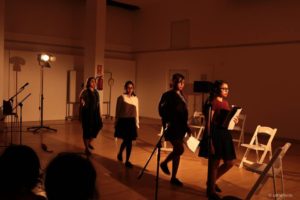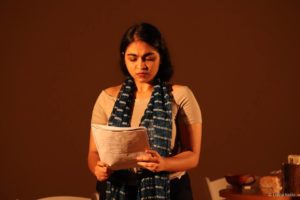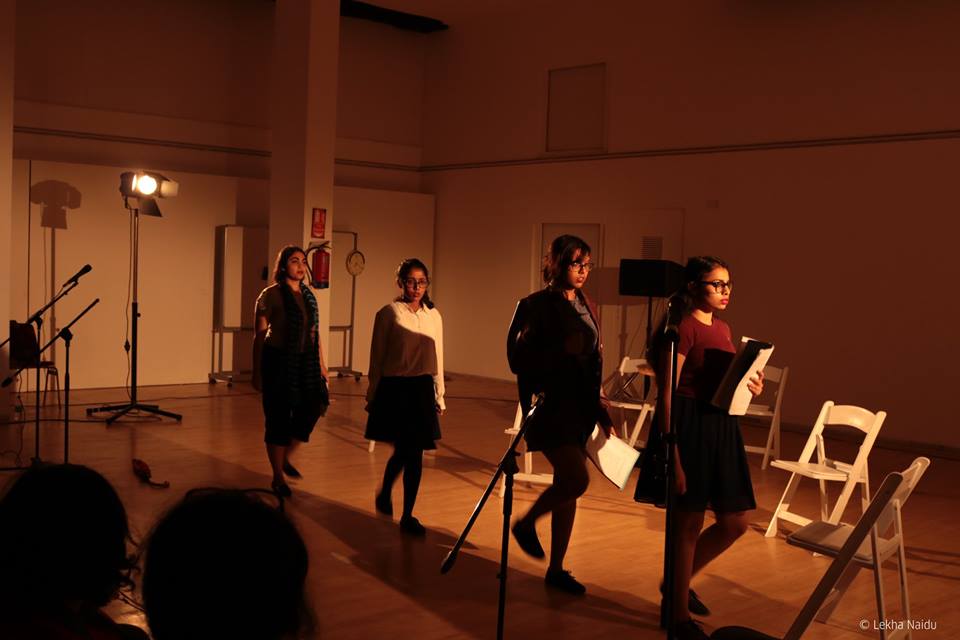“I think I work better with women. I wanted these voices to be heard on stage”, said director Lekha Naidu as she smiled mischievously at her 4 women cast sitting beside her who had just finished a dramatised reading of the play ‘The Jazz Conductor’ to a full house at Goethe-Institut Bangalore.

Actors stand in formation as they travel back in time to WWII Germany. (Source: facebook.com)
‘The Jazz Conductor’ is part of the German Spotlight series organised by Goethe-Institut and Sandbox Collective. The Spotlight series is a collaboration to celebrate works of contemporary German playwrights and present them to an Indian audience through plays or dramatised readings. On 28th July, Goethe saw an excited crowd outside the venue sipping chai-coffee and munching on hot samosas while waiting for the reading to begin. Every few minutes, a girl would peek out from the curtains inside, count the number of people standing, whisper something to another girl and go back in. Director Lekha Naidu later writes in a Facebook post that they had only prepared 35 chairs in the beginning, expecting only a few people and getting a full house.
At exactly 7 pm, the glass doors open and the audience streams in one after the other. Chairs are still being hauled in by the organisers from the storage room and the rows keep increasing until they reach the very end of the hall. The stage is on the same level as the audience and 4 girls are sitting in chairs, two of them holding a ukulele and a copy of the script in hand. A sheet carrying all the background information and premise of the play is distributed to the audience before the reading starts. The girls look at each other, smile nervously and the lights dim.
Translated from the German play Der Jazz-Dirigent by Wolfgang Sréter, the story of ‘The Jazz Conductor’ is located in 20th century Germany during the Second World War. It’s the jazz age and music has found its way into the country and as a result, has ignited sparks of dissent in some people — including the main character, Paul Weißenburger. Paul dreams of being a jazz conductor for a big American Swing Orchestra while being stuck working in a Nazi regime. The play is presented in the form of a monologue, narrated by Paul’s niece many years later. The 4 actors play the roles of the niece, the uncle, and the minor characters interchangeably. All of their voices become united in telling the story.

Paul’s niece delivering her monologue. (Source: facebook.com)
Once she’s done controlling the lights, adding audio effects and single-handedly managing the stage from her little desk on the side, director Lekha Naidu sits down for a quick chat. Naidu says that her decision to cast all women actors for this reading was a conscious one because she wanted to bring out a sense of innocence in this retelling.
Even though the play was originally a monologue, she decided to add more than one voice to it to be able to capture differences and make it more dynamic. Her decision seemed to work because every actor added a new layer to the characters they shared. The women changed characters with ease by putting on a different accessory (a hat, a shawl, a stick) and taking on a new role. The stage became the inside of their house as they glided from one corner to the other for different scenes. After a while, they all seemed to merge into one body but with different voices as they all played each other’s characters.
Sitting in the front row, audience member Sukla Guha said that she was very impressed with the direction and the atmosphere that they were able to create with such a low production. This was her first time at a dramatic reading and she was surprised at how casual and intimate it felt compared to plays. She looks forward to attending more in the future, she added excitedly.
Once the event comes to an end, the four actors huddle up together with Lekha Naidu and they seem to be smiling brightly at each other after a successful show. This reminds me of what Naidu said in the beginning – “I think I work better with women.”
Dipannita Mukherjee
Latest posts by Dipannita Mukherjee (see all)
- Telltale metallic wardrobes and other family heirlooms - 28th October 2019
- E for egg - 19th January 2019
- Kathas Rewind - 28th September 2018





